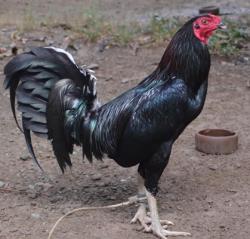 A mid-2019 article in the LA Times by staff writer Jaclyn Cosgrove, confirmed antagonism towards the California Department of Food and Agriculture in response to the ongoing control measures to eradicate exotic Newcastle disease (END). The appellation "exotic" is a misnomer with regard to the outbreak in the three contiguous counties of San Bernardino, Riverside and Los Angeles in Southern California. Any outbreak that resists control and eradication for twenty months cannot in fairness be regarded as exotic. To accept reality, the outbreak may be considered contiguous with the endemic status of poultry in northern Mexico.
A mid-2019 article in the LA Times by staff writer Jaclyn Cosgrove, confirmed antagonism towards the California Department of Food and Agriculture in response to the ongoing control measures to eradicate exotic Newcastle disease (END). The appellation "exotic" is a misnomer with regard to the outbreak in the three contiguous counties of San Bernardino, Riverside and Los Angeles in Southern California. Any outbreak that resists control and eradication for twenty months cannot in fairness be regarded as exotic. To accept reality, the outbreak may be considered contiguous with the endemic status of poultry in northern Mexico.
The classic approach to eradication of END in commercial farms involves rapid identification of infected flocks, euthanasia and disposal followed by thorough decontamination of premises. This approach is obviously coupled with quarantine and surveillance within a two-mile zone around the index farm and monitoring flocks within a wider zone. Following an outbreak, all commercial farms should apply enhanced biosecurity involving personnel, feed delivery vehicles and intra-company bird transfer.
 The approach to backyard flocks is entirely different. The whack-a-mole approach to eradication involving euthanasia of infected small flocks and preemptive depletion in areas with a high incidence of infection has not worked since May 2018. Forced depletion of small flocks of unaffected domestic chickens and other galliformes that are confined to their premises creates antagonism among owners. In the case of Southern California the approach of depletion of infected flocks is justified. Preemptive euthanasia of small and uninfected flocks is clearly ineffective.
The approach to backyard flocks is entirely different. The whack-a-mole approach to eradication involving euthanasia of infected small flocks and preemptive depletion in areas with a high incidence of infection has not worked since May 2018. Forced depletion of small flocks of unaffected domestic chickens and other galliformes that are confined to their premises creates antagonism among owners. In the case of Southern California the approach of depletion of infected flocks is justified. Preemptive euthanasia of small and uninfected flocks is clearly ineffective.
The California Department of Food and Agriculture must recognize that there are differences among so-called "backyard and exhibition flocks" so dutifully recorded each week. This designation represents at least two distinct sub-populations. Backyard chickens kept for egg production or as pets or hobby birds are far less important in the epidemiology of END than fighting cocks. This category is subject to frequent movement in accordance with their function, and owners will not respect quarantines. Since it is now illegal to engage in cock fighting, participants will clearly not comply with restrictions on movement as the activity is now 'underground. The threat of preemptive slaughter will simply encourage dispersal of birds. This factor was probably responsible for extension of END from Southern California to isolated outbreaks in Alameda County and to Utah and Arizona during 2019. The fact that a marked increase in incident cases was recorded in December 2018 and in all probability has repeated in December 2019 extending through January and possibly February 2020 should direct the attention of the CDFA towards fighting cocks in dissemination of infection. Backyard hens maintained as pets or for table eggs do not move from their premises although they are held under conditions of low biosecurity. Exotic show birds will be confined by their owners if shows are cancelled as a component of a regional quarantine.
Based on experience in the control of Newcastle disease in tropical countries, the following suggestions are provided for consideration by CFDA:
· Hyperimmunize at least 95 percent of backyard chickens using available live and inactivated vaccines.
· Encourage or otherwise oblige owners of backyard hens and other galliformes to confine their flocks under cover to avoid contact with free-living birds. In this respect is the State or regional authority not following the same conditions that are required for dogs and cats mandating licensing, vaccination and confinement
· Apply what little credibility and cooperation that remains between the Department and the owners of backyard hens to enhance biosecurity including restrictions on inter-property movement.
· Suspend all bird shows in the State until the outbreak is officially declared at an end. This will require 13 week from depletion of the last diagnosed case.
· Direct resources and control activities to the high-risk sub-population of fighting cocks. In the 2003 outbreak, the Department together with USDA-APHIS established rapport with the communities owning fighting cocks. It is not clear whether there is any goodwill remaining or whether current policies have alienated owners of game fowl who are not reporting illness in their birds. Again hyperimmunization of this sub-population should be encouraged.
The contention that it is necessary to euthanize asymptomatic and non- infected hens in order to end the END outbreak is fallacious. Twenty months of effort confirm the futility of the current program of attempted eradiation. There is concern that eradication efforts are directed towards a "soft-constituency" comprising homeowners. It may be that for various reasons the CDFA is avoiding the epidemiologically significant fighting cocks and the demographic owning them.
Coexistence of flocks of susceptible backyard hens and fighting cocks in close proximity to commercial farms inevitably results in emergence of END in large units. This was the case in the 2003 outbreak and with the Riverside County cases in mid-December 2018 affecting approximately 350,000 chickens on three farms. The CDFA must recognize that they are now operating in the era of social media that has considerable influence over politicians at the state and national levels. Antagonizing owners of backyard hens through a program of preemptive depopulation will effectively extend the duration of the outbreak and encourage movement of fighting cocks out of quarantined areas to the detriment of the commercial industry.
The advent of the New Year would be an opportunity to pause and reflect on what has been accomplished and how a program could be modified or improved to achieve the objective of eradication. It is possible that the endemic status of END in the three contiguous Southern California counties will persist given movement of live birds, contaminated vehicles and personnel northwards from Mexico. It is indeed fortunate with respect to exports that our southern neighbor has accepted the OIE principle of regionalization and has not imposed blanket bans on individual states. To paraphrase Einstein, continuing to pursue an ineffective program and expect a positive outcome is illogical. To put it another way if you are in a deep hole, stop digging.